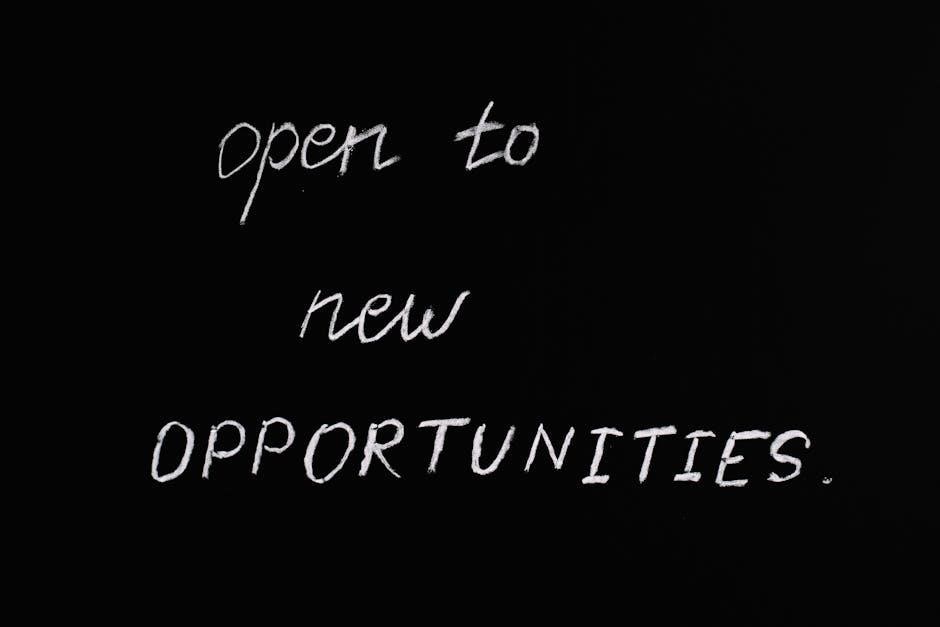
Carol Dweck’s groundbreaking work introduces the concept of fixed and growth mindsets‚ revealing how our beliefs about ability shape success in education‚ sports‚ and beyond by influencing our approach to challenges and opportunities.
Overview of Carol S. Dweck’s Work
Carol S. Dweck‚ a renowned psychologist‚ introduced the groundbreaking concept of fixed and growth mindsets in her seminal work‚ Mindset: The New Psychology of Success. Her research challenges traditional views of ability and talent‚ emphasizing that success stems from how individuals approach challenges. Dweck’s work spans decades‚ focusing on motivation‚ personality‚ and development‚ with a particular emphasis on how mindsets influence achievement. Her theories have revolutionized education‚ sports‚ and workplace dynamics‚ offering practical strategies for fostering resilience and lifelong growth. By distinguishing between fixed and growth mindsets‚ Dweck provides a framework for understanding and enhancing human potential‚ making her work widely applicable and transformative.
The Concept of Fixed and Growth Mindsets
Carol Dweck’s theory distinguishes between two primary mindsets: fixed and growth; A fixed mindset assumes abilities are innate and unchangeable‚ leading to avoidance of challenges to protect self-image. In contrast‚ a growth mindset views talents as developable through effort and perseverance‚ embracing challenges as opportunities for growth. These mindsets profoundly influence behavior‚ resilience‚ and success across various domains. Understanding this distinction is crucial for personal development and fostering a culture of continuous improvement. Dweck’s insights highlight the power of mindset in shaping outcomes‚ emphasizing that growth-oriented individuals are more likely to achieve their full potential by persisting through obstacles and learning from failures.
Why Mindset Matters in Achieving Success
Mindset plays a pivotal role in achieving success because it shapes how individuals perceive challenges and setbacks. Those with a growth mindset believe abilities can be developed‚ fostering resilience and a love for learning. This perspective drives persistence and adaptability‚ essential for overcoming obstacles. In contrast‚ a fixed mindset limits potential by avoiding challenges to protect ego. Dweck’s research shows that mindset influences motivation‚ effort‚ and ultimate achievement. Cultivating a growth mindset allows individuals to embrace failure as a growth opportunity‚ leading to greater success and fulfillment. Thus‚ understanding and nurturing mindset is crucial for unlocking human potential and sustaining long-term success in various fields.
Key Concepts in the Book
Carol Dweck explores how mindsets shape success‚ emphasizing growth over fixed perspectives‚ and discusses intelligence‚ praise‚ and feedback as critical factors in personal and professional development.
Fixed Mindset: Definition and Characteristics
A fixed mindset is the belief that abilities and intelligence are innate and unchangeable. Individuals with this mindset view talent as the primary driver of success and often avoid challenges that might expose their limitations. They tend to seek validation through effortless achievement and may feel threatened by others’ success. This mindset fosters a fear of failure‚ as it is perceived as a reflection of their inherent ability. Fixed-minded individuals often plateau early‚ as they resist learning from setbacks and hesitate to embrace new opportunities for growth and development. This limiting perspective can hinder personal and professional progress throughout life.
Growth Mindset: Definition and Characteristics
A growth mindset is the belief that abilities and intelligence can be developed through dedication and hard work. Individuals with this mindset view challenges as opportunities for growth and learning‚ rather than threats to their ego. They embrace effort as a key driver of success and persist in the face of obstacles. Growth-minded people seek feedback to improve and are inspired by others’ achievements‚ recognizing that success is a result of perseverance and adaptability. This mindset fosters resilience‚ creativity‚ and a love for learning‚ leading to continuous personal and professional development throughout life. It emphasizes that potential is limitless and can be cultivated over time.
The Role of Intelligence and Ability in Success
Carol Dweck’s work challenges the notion that success is primarily determined by innate intelligence or ability. Instead‚ she emphasizes that mindset plays a crucial role in achieving success. While intelligence and talent provide a foundation‚ it is the mindset that dictates how individuals utilize and develop these traits. A fixed mindset often leads people to believe their abilities are static‚ limiting their potential and willingness to embrace challenges. Conversely‚ a growth mindset enables individuals to view intelligence and ability as malleable‚ fostering a proactive approach to learning and improvement. Ultimately‚ mindset influences how effectively one’s natural talents are cultivated and applied to achieve success. This perspective shifts the focus from inherent ability to the processes of growth and development.
Praise and Its Impact on Self-Esteem and Achievement
Carol Dweck highlights how praise can significantly influence self-esteem and achievement‚ particularly in fostering fixed or growth mindsets. Praising intelligence or ability can reinforce a fixed mindset‚ making individuals avoid challenges to preserve their self-image. This type of praise can lead to fear of failure‚ as it ties success to inherent talent rather than effort. In contrast‚ praising effort or persistence encourages a growth mindset‚ promoting resilience and a focus on learning. Dweck emphasizes that meaningful praise should acknowledge hard work and progress‚ not just natural ability‚ to cultivate self-esteem and achievement effectively. This approach helps individuals embrace challenges and view setbacks as opportunities for growth.

Implications for Education
Carol Dweck’s work transforms education by showing how fostering a growth mindset enhances student engagement‚ resilience‚ and academic performance‚ emphasizing effort and learning over innate ability.
Mindset in the Classroom: Teachers’ Perspectives
Teachers play a crucial role in fostering growth mindsets by encouraging effort‚ learning from failure‚ and persistence. They can create environments where challenges are embraced as opportunities for growth‚ rather than threats to ego. By understanding the difference between fixed and growth mindsets‚ educators can adapt their teaching strategies to promote resilience and a love for learning. Many educators have reported positive outcomes‚ such as increased student engagement and improved academic performance‚ after implementing mindset principles in their classrooms. This approach not only enhances student success but also empowers teachers to inspire lifelong learners.
Students’ Mindsets and Academic Performance
Students with a growth mindset demonstrate higher levels of academic performance and resilience. They view challenges as opportunities for growth‚ leading to increased effort and persistence. Research shows that these students are more likely to achieve their full potential‚ as they embrace learning from failures. Conversely‚ those with a fixed mindset may avoid challenges and show decreased performance under pressure. By promoting growth mindsets‚ educators can empower students to take ownership of their learning and develop a deeper understanding of their capabilities. This mindset shift can lead to significant improvements in overall academic success and long-term personal growth.
Strategies for Fostering a Growth Mindset in Education
Educators can foster a growth mindset by emphasizing effort over talent and providing constructive feedback. Encouraging students to view challenges as learning opportunities and promoting a culture of persistence and resilience helps. Incorporating growth mindset language in daily interactions and modeling a growth mindset themselves are effective strategies. Offering choice and autonomy in learning allows students to take ownership of their progress. Celebrating effort and persistence‚ rather than just results‚ reinforces the value of hard work. Additionally‚ integrating mindset-focused activities and discussions into the curriculum can deepen students’ understanding and application of growth mindset principles. These strategies collectively create a supportive environment for students to thrive academically and personally.

Implications for Sports and Athletics
Carol Dweck’s work reveals that a growth mindset enhances athletes’ performance and resilience. Coaches can foster this by emphasizing effort and learning from setbacks‚ driving continuous improvement.
Coaches’ Perspectives on Mindset
Coaches increasingly recognize the power of mindset in shaping athletes’ performance and resilience. Many adopt Carol Dweck’s principles‚ emphasizing effort over talent and fostering a growth mindset to enhance adaptability and perseverance. By reframing challenges as opportunities for growth‚ coaches help athletes embrace failures as learning experiences. This approach not only improves skill development but also builds mental toughness and teamwork. Coaches who integrate mindset training report noticeable improvements in athletes’ confidence‚ focus‚ and overall performance. The mindset framework has become a cornerstone for modern coaching‚ enabling athletes to unlock their full potential and thrive under pressure‚ both on and off the field.
Athletes’ Mindsets and Performance
Athletes’ mindsets play a crucial role in their performance and success. Those with a growth mindset view challenges as opportunities to improve‚ leading to increased resilience and adaptability. They embrace effort‚ persistence‚ and learning from failures‚ which enhances skill development and mental toughness. In contrast‚ athletes with a fixed mindset may avoid challenges‚ fearing failure will reveal their limitations. Coaches and psychologists emphasize that fostering a growth mindset helps athletes overcome setbacks‚ build confidence‚ and achieve higher levels of performance. By focusing on progress rather than perfection‚ athletes with a growth mindset often outperform their peers‚ even if they start with similar abilities‚ ultimately reaching their full potential in sports.
Building Resilience Through a Growth Mindset
Resilience is deeply rooted in the growth mindset‚ where individuals view challenges as opportunities for growth rather than threats to ego. By embracing effort and persistence‚ people develop the ability to bounce back from setbacks. A growth mindset fosters adaptability‚ enabling individuals to reframe failures as stepping stones for improvement. This approach contrasts with a fixed mindset‚ where setbacks are seen as insurmountable obstacles. Strategies like embracing challenges‚ learning from feedback‚ and focusing on progress rather than perfection help build resilience. Over time‚ this mindset equips individuals to navigate adversity with confidence‚ leading to personal and professional success while fostering lifelong well-being and adaptability.
Implications for the Workplace
A growth mindset fosters innovation‚ adaptability‚ and collaboration in the workplace‚ leading to enhanced productivity and a resilient workforce capable of thriving in ever-changing dynamic environments.
Leadership and Mindset
Leadership and mindset are deeply interconnected‚ as a leader’s mindset significantly influences organizational culture and employee development. Leaders with a growth mindset foster innovation‚ resilience‚ and collaboration‚ creating environments where employees feel empowered to grow and take risks. They prioritize learning over perfection‚ encouraging feedback and continuous improvement. In contrast‚ leaders with a fixed mindset may stifle growth by focusing on maintaining authority rather than developing their teams. Dweck’s work highlights how growth-minded leaders cultivate a culture of adaptability and collective progress‚ ultimately driving long-term success. This approach not only enhances individual potential but also strengthens overall team performance and organizational agility in dynamic environments.
Employee Development and Growth Mindset
Employee development is significantly enhanced when organizations adopt a growth mindset. This approach emphasizes that abilities can be cultivated through effort and learning‚ fostering a culture of continuous improvement. Employers who encourage challenges‚ provide constructive feedback‚ and celebrate progress nurture employee potential. Research shows that employees in growth-oriented environments are more resilient‚ innovative‚ and committed to their roles. By shifting from a fixed to a growth mindset‚ companies can unlock hidden talents and create a workforce capable of adapting to rapid changes. This mindset not only benefits individual employees but also drives organizational success and sustainability in competitive markets by fostering a culture of lifelong learning and development.
Team Collaboration and Mindset
A growth mindset fosters effective team collaboration by encouraging open communication‚ shared learning‚ and collective growth. When team members believe their abilities can evolve‚ they are more likely to embrace challenges‚ share ideas‚ and learn from one another. This mindset promotes psychological safety‚ allowing individuals to voice opinions without fear of judgment. In contrast‚ fixed mindsets can hinder collaboration‚ as team members may prioritize appearing competent over contributing to the group’s success. By cultivating a growth mindset‚ teams can enhance problem-solving‚ innovation‚ and overall performance‚ creating a culture where diverse perspectives and continuous improvement drive shared achievements and organizational success. This approach ensures that collaboration becomes a powerful tool for growth and innovation.

How to Cultivate a Growth Mindset
Cultivating a growth mindset involves embracing challenges‚ persisting through obstacles‚ and viewing failure as a learning opportunity. It requires self-awareness‚ openness to feedback‚ and intentional practice in reframing negative thoughts into growth-oriented ones. By setting learning goals and celebrating progress‚ individuals can foster resilience and a belief in their potential for development. This mindset shift enables continuous improvement and a deeper understanding of one’s capabilities‚ leading to greater fulfillment and success in both personal and professional realms. The key is to remain committed to growth and lifelong learning.
Recognizing and Changing Fixed Mindset Traits
Recognizing fixed mindset traits involves identifying beliefs that abilities are innate and unchangeable. Individuals with a fixed mindset often fear failure‚ avoid challenges‚ and feel threatened by others’ success. To change these traits‚ one must first acknowledge them and understand their limitations. Embracing a growth mindset requires reframing challenges as opportunities for growth rather than threats to ego. This shift involves accepting effort as a path to improvement and viewing criticism as constructive feedback. Self-awareness is the first step‚ followed by intentional practice in adopting growth-oriented behaviors. Over time‚ this mindset transformation fosters resilience‚ creativity‚ and a belief in one’s potential for development. Progress‚ not perfection‚ is the goal.
Embracing Challenges as Opportunities for Growth
Embracing challenges is central to cultivating a growth mindset. Individuals with this mindset view obstacles as opportunities to learn and improve‚ rather than threats to their ego. By reframing challenges as pathways to growth‚ they develop resilience and confidence. Effort becomes a valued tool for progress‚ and setbacks are seen as temporary steps toward mastery. This perspective fosters creativity‚ as challenges encourage innovative thinking and problem-solving. Overcoming difficulties builds a sense of accomplishment and reinforces the belief in one’s potential for development. Embracing challenges transforms fear into curiosity and failure into a stepping stone for success‚ aligning with the core principles of Dweck’s growth mindset philosophy.
The Role of Feedback in Mindset Development
Feedback plays a pivotal role in shaping mindsets‚ particularly in fostering a growth mindset. Constructive feedback helps individuals recognize progress‚ identify areas for improvement‚ and understand the connection between effort and achievement. In a growth mindset‚ feedback is viewed as a tool for learning rather than a judgment of ability. Praise should focus on effort‚ persistence‚ and strategies rather than innate talent or intelligence. Regular‚ specific feedback encourages self-reflection and adaptability‚ empowering individuals to take ownership of their development. By embracing feedback as a catalyst for growth‚ people can enhance their resilience‚ motivation‚ and overall performance‚ aligning with Dweck’s principles of continuous improvement and lifelong learning.

Impact on Personal Growth
A growth mindset fosters resilience‚ redefines success‚ and encourages embracing challenges as opportunities for self-improvement‚ leading to a more fulfilling and purpose-driven life.
Mindset and Self-Improvement
A growth mindset is a powerful tool for self-improvement‚ enabling individuals to embrace challenges‚ learn from failures‚ and continuously develop their abilities. By believing that talents can be cultivated‚ people unlock their potential for personal growth. This mindset fosters resilience‚ helping individuals overcome obstacles and adapt to feedback. It encourages a focus on effort and progress rather than perfection‚ leading to greater fulfillment. Dweck’s work highlights how shifting from a fixed to a growth mindset can transform one’s approach to life‚ fostering lifelong learning and self-improvement. This perspective empowers individuals to redefine success and strive for excellence in all areas of life.
Building Lifelong Resilience
Cultivating a growth mindset is foundational to building lifelong resilience‚ enabling individuals to navigate challenges with confidence and adaptability. By viewing obstacles as opportunities for growth‚ people develop the capacity to recover from setbacks and persist in the face of adversity. Resilience is not an innate trait but a skill that can be nurtured through effort and learning. A growth mindset fosters a belief in the malleability of abilities‚ encouraging individuals to embrace failure as a stepping stone to improvement. Over time‚ this perspective strengthens emotional and mental fortitude‚ empowering individuals to thrive in an ever-changing world and face future challenges with optimism and determination.
Redefining Success Through Mindset
Carol Dweck’s work challenges traditional notions of success‚ emphasizing that it is not solely defined by achievements or talents. Instead‚ success is deeply rooted in the mindset one adopts. A growth mindset redefines success as a journey of continuous learning‚ effort‚ and resilience. It shifts focus from external validation to internal growth‚ where progress and self-improvement are valued over perfection. By embracing challenges and viewing failures as opportunities to learn‚ individuals cultivate a deeper sense of accomplishment. This perspective transforms success into a dynamic and personal process‚ empowering people to pursue their potential with purpose and fulfillment‚ rather than merely chasing external measures of achievement.
Carol Dweck’s “Mindset: The New Psychology of Success” revolutionizes how we view achievement‚ emphasizing that success is shaped by our mindset‚ resilience‚ and willingness to embrace growth and challenges.
Carol Dweck’s “Mindset: The New Psychology of Success” introduces the transformative concept of fixed and growth mindsets‚ highlighting how these beliefs shape achievement across various domains. A fixed mindset sees abilities as innate‚ while a growth mindset embraces challenges as opportunities for development. The book emphasizes the importance of praise‚ feedback‚ and resilience in fostering success. Dweck argues that intelligence and talent alone do not guarantee achievement; rather‚ it is the mindset that drives progress. By adopting a growth mindset‚ individuals can redefine success‚ build lifelong resilience‚ and unlock their true potential. This framework has profound implications for education‚ sports‚ and the workplace‚ offering practical strategies for personal and professional growth.
The Future of Mindset Research and Applications
Research on mindsets continues to expand‚ exploring new applications in education‚ sports‚ and the workplace. Future studies may focus on integrating technology to personalize growth mindset development. The concept is being adapted across cultures‚ ensuring its universal relevance. Collaborations between psychologists‚ educators‚ and industry leaders will drive innovative strategies to foster resilience and lifelong learning. As mindset principles become mainstream‚ their impact on societal progress and individual potential is expected to grow‚ offering new pathways to success and self-improvement in an ever-changing world. The future holds promise for transforming how we approach challenges and unlock human potential on a global scale.
 the good and beautiful bible study pdf
the good and beautiful bible study pdf  memorial day word search pdf
memorial day word search pdf  recovering from emotionally immature parents pdf
recovering from emotionally immature parents pdf  humayun ahmed pdf
humayun ahmed pdf  c.s. lewis mere christianity pdf
c.s. lewis mere christianity pdf  pathfinder character sheet pdf fillable
pathfinder character sheet pdf fillable  magic bullet user manual
magic bullet user manual  kctv guide
kctv guide  sample shipper’s letter of instruction
sample shipper’s letter of instruction